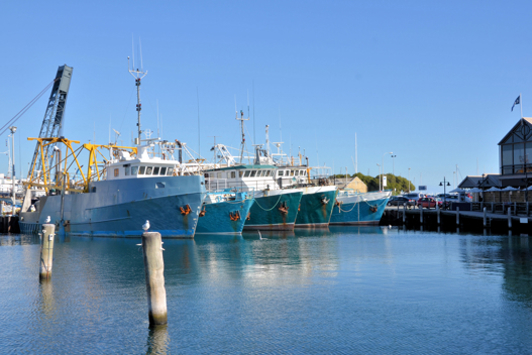Commercial fishing, pearling, and aquaculture contributes around one billion dollars to WA’s economy each year, providing direct employment for around 5,000 people, plus many more in associated industries. Based primarily on small family businesses, 85% of WA’s commercial fishing activity is conducted in remote coastal communities.
WA's major commercial fisheries are low-volume, high-value fisheries, many based in inshore and estuarine areas. The following fisheries account for roughly 80% of the market by value, with the remaining 20% from numerous smaller commercial fisheries:
- West Coast Rock Lobster Managed Fishery
- Pearl Oyster Fishery
- Shark Bay Prawn Managed Fishery
- Northern Demersal Scalefish Managed Fishery
- Pilbara Fish Trawl Interim Managed Fishery
- Exmouth Gulf Prawn Managed Fishery.
Marine park compensation
The Fishing and Related Industries Compensation (Marine Reserves) Act 1997 is the mechanism used to enable fair and reasonable compensation to be paid to commercial fishers whose licences decline in value as a result of areas being closed to fishing when marine parks are introduced.
You can make an application for compensation with respect to:
- an aquaculture lease
- an aquaculture licence
- a commercial fishing licence
- a fishing boat licence
- a fish processor's licence
- a farm lease
- a managed fishery licence
- an interim managed fishery licence
- a hatchery licence
- a hatchery permit
- a pearling lease, or
- a pearling permit.
DPIRD will work through applications on a fishery-by-fishery basis, though negotiations may occur concurrently for multiple fisheries.
Marine park compensation FAQs
-
Marine park compensation for commercial fishers - FAQspdf (273 KB)
-
Compensation process for the Greater Kimberley Marine Park and South Coast Marine Parkpdf (177 KB)
-
Voluntary fisheries adjustment scheme - FAQspdf (187 KB)
Contact us
-
WA Fisheries and Marine Research Laboratories39 Northside Drive, Hillarys WA 6025, Australia

